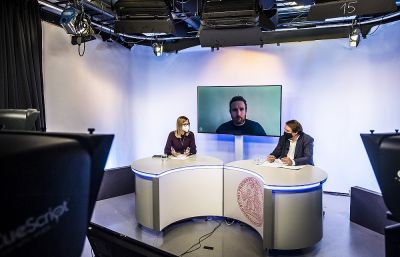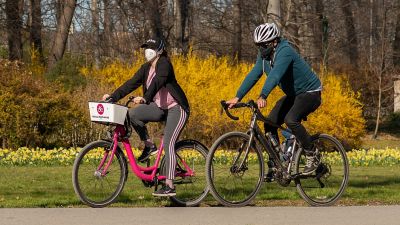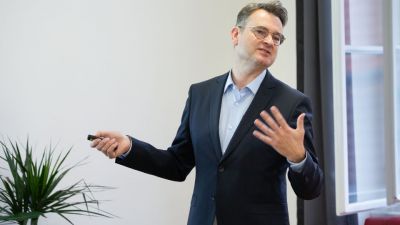Experts vs. “experts” - Scientists in the Media was the title of an online panel discussion on Thursday hosted by Kampus Hybernská. Four invited speakers – two well-known science journalists and two scientists, discussed the difficulties of their fields and where they overlapped, as well as the danger and damage caused by fake experts spreading disinformation and denial.

LtR: biologist Ruth Tachezy, co-host E. Koňaříková and journalist Petr Koubský. Bottom, from left: media expert Václav Štětka, radio journalist Filip Rambousek, co-host T. Mašínová.
Organised by Eliška Koňaříková and Tereza Mašínová (with the help of the Innovation Lab at Kampus Hybernská, and under the auspices of Hyb4City and Charles University’s Centre for Knowledge and Technology Transfer), the debate purposely sidestepped the word Covid the way The Godfather avoided the word mafia (or The Walking Dead, zombies), for the sake of more constructive and broader discussion. It was nevertheless lost on no one that it is precisely the pandemic over the last two years that has put science, medicine, and science reporting centre stage, in real-time. First, as the virus spread from country-to-country in early 2020, and then as researchers and pharmaceutical companies raced to develop effective vaccines.
Science reporting, as well as scientists' potential influence on public policy and preventive measures (vaccines, social distancing, masks), take on a new urgency in a pandemic, where speed is vital and a novel pathogen represents a host of unknowns. Yet data as it develops, not least in times of emerging crisis, can also be open to misinterpretation, politicisation, disinformation or simply mistakes, muddying the water - causing confusion or eroding public confidence.
With the country suffering an unexpected resurrgence, and the health care system again bracing against collapse, speakers on Thursday examined the role scientists have in the media as well as the responsibility of science journalists when reporting on a situation of “shifting sands” like a pademic, when things are in flux and quickly changing. That said, the debate went well beyond Covid-19, examining scientific research and the field of science reporting also in more general terms.
Who were the panellists? Seasoned journalist Petr Koubský (Deník N), Czech Radio science reporter Filip Rambousek, Charles University professor, biologist and researcher Ruth Tachezy (well-known in the public eye as a member of the disinformation initiative Snih and MeSES advising on the epidemic), and Václav Štětka, a senior lecturer on media and communications at Loughborough University in the UK. Outlined from the get-go was just how much at odds approaches in media and science can be.
Václav Štětka kicked off the discussion:
“The world of media and of science are in many ways polar opposites if we are talking about the internal logic that drives each. When it comes to information, media are required to be fast, clear, concise and straightforward. The media generates such information and that is the kind of information expected by its users. In cases, where the info [does not meet those standards], the media will mould it into a form that satisfies that criteria. Stories need to be simple so they can be explained in a few sentences. Those are standard newsroom approaches…
“The world of science, by contrast, is much slower, complicated, not without internal contradictions, non-linear, it can be non-cumulative, findings over time can be proven wrong, theories can be abandoned, certainties given up and replaced by new findings, and those are all better-case examples. Because it is often the case that there are alternative theories that are pitched against each other. It can take years for a consensus to be found on a certain hypothesis – if a consensus is even found! It’s not unusual for differences to persist.”
It is these opposing tendencies that can make a science reporter’s job all the more complicated and make it crucial to get the facts right. Deník N’s Petr Koubský, a journalist with some 25,000 followers on Twitter, joked in the discussion that when he took up the science beat at the daily at “pre-retirement age” he hoped it would be pleasant and quiet work. But nothing could be further from the truth, he confirmed. In short, the field demands constant adaptation, understanding and a fastidious approach.
Fellow journalist Filip Rambousek described his own experience, outlining one successful approach in reportage: focusing on a given issue and problem and building around it, speaking to scientists iinvested in the subject, but with varying or different viewpoints, to get a bigger understanding of the subject. That can lead to a robust presentation of ideas and reveal cracks or dissenting views without giving credence to disinformation that has little place in serious scientific debate.
Indeed, the very title of Thursday’s event Experts versus “experts” brought to mind the split between a majority of scientists and a vocal minority in the media and social media in Czechia when it comes to the Covid crisis, regarding aspects (early on) such as the danger of the disease, transmission and later effectiveness and safety of vaccines, the impact of lockdowns versus re-opening, and an issue raging among some civic associations framed as one of personal freedom: the potential recognition of naturally-gained immunity. All topics have been at times something of a minefield, made all the more serious by the fact the pandemic is not hypothetical but a real global crisis.
The panel gave examples where the media itself at times had been complicit, too often falling back on experts who were not really that at all but vocal and media savvy personalities. Another takeaway from the debate was that not all so-called experts speak in the media with the necessary gravity, self-awareness, or sense of ethics or responsibility the situation requires.
There are other "mines" to avoid as well, sometimes laid by journalists themselves. Biologist Ruth Tachezy:
“It happened that we agreed beforehand on the topics to be discussed, that I was asked completely different questions.”
Another difficulty, she pointed out, was some journalists confused scientific findings with scientists' personal opinions.
“We are just people and we have our own opinions, but it should always be clear whether I am expressing my own opinion or speaking for a larger group.”
Václav Štětka argued that even when scientists explicitly laid out facts or findings and only expressed their own opinion afterwards, media often blurred the difference, tapping the juiciest part of the interview for its own purposes ie. to make the article more attractive. Scientific communicators, he stressed, needed to be more careful, something which many who were unexpectedly cast into the media spotlight over the course of the pandemic have no doubt since learned.
The last part of the debate looked at how findings and how the media reported abroad, for example in the UK or Germany, with the UK having far more aggressive tabloid media, according to Štětka, than the Czech Republic. There some of the issues being hashed out in the media and social media in the Czech Republic, but somewhat more tamely – not blared as loudly on newspaper front pages, at least not yet (although that too may change).
Organisers at Kampus Hybernská, together with Hyb4City and the Centre for Knowledge and Technology Transfer, proved even as the country hits its latest wave and cases hit record high numbers, it is important for solid discussion to continue and for participants to discuss ideas and for members of the public to actively participate and pose questions of their own. Covid was not often mentioned over the course of the evening, but it nevertheless framed the issues. This much is certain: both the role of scientists in the media and how science is covered by reporters remain fascinating and urgent questions that go beyond just the current crisis.
| Ruth Tachezy, Ph.D. |
| Ruth Tachezy graduated from the Faculty of Science of Charles University in Prague, majoring in molecular biology and genetics. After a one-year stay at the Department of Parasitology at the Faculty of Science of Charles University, she worked at the Department of Experimental Virology and later at the Institute of Hematology and Blood Transfusion. Since 1998, she has been the head of the National Reference Laboratory for Papillomaviruses and Polyomaviruses. She is a member of the Snih Initiative and the Interdisciplinary Group on Epidemic Situations (MeSES). She also lectures, reviews articles and publishes in international and national peer-reviewed and popular science journals. She appears frequently in the Czech media. |
| Ing. Petr Koubský, Csc. |
| Petr Koubský studied chemistry and cybernetics, has written and translated several books on IT, teaches at the University of Economics and the Faculty of Science of Charles University. He worked as a programmer, then at Softwarový noviny, was editor-in-chief of Inside magazine, director of iCollege and publisher of the web magazine 067. Now he works at the Daily N, he is the science and technology editor. He received the 2020 Ferdinand Peroutka Prize for his work in popularizing science. |
| Mgr. Filip Rambousek |
| Filip Rambousek is a radio journalist and presenter focusing on science, research and the environment. He has recorded dozens of interviews and reports with a number of renowned scientists from the Czech Republic and abroad, including four Nobel Prize laureates. He occasionally moderates panel discussions and cultural events. He studied German and Austrian Studies at Charles University in Prague and the Nationalism Studies Program at the Central European University in Budapest and Vienna. |
| Václav Štětka, Ph.D. |
| Václav Štětka teaches Media Studies and Political Communication at Loughborough University, UK. During his academic career he has also worked at Masaryk University, the University of Oxford and Charles University. His current research focuses on the influence of the media on the process of political polarization in Central and Eastern Europe. He is a member of a number of international research projects and networks on media and communication. In 2019, he received the Award of the President of the Grant Agency of the Czech Republic for outstanding scientific achievements. |

























